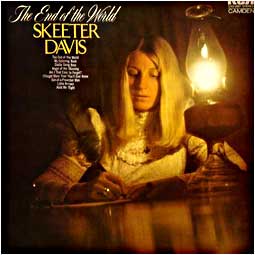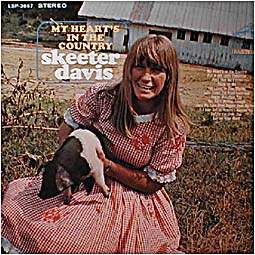


SKEETER DAVIS
Skeeter Davis has
never gotten a lot of critical attention, but in the '50s and '60s, she recorded
some of the most accessible crossover country music, occasionally skirting rock
& roll. Born Mary Penick, Davis took her last name after forming a duo with
Betty Jack Davis, the Davis Sisters. Their 1953 single "I Forgot More Than
You'll Ever Know" was a big country hit; its B-side, the remarkable "Rock-a-Bye
Boogie," foreshadowed rockabilly. That same year, however, the duo's career was
cut short by a tragic car accident in which Betty Jack was killed and Skeeter
was severely injured. Skeeter did attempt to revive the Davis Sisters with Betty
Jack's sister but was soon working as a solo artist.
In the early '60s, Davis followed the heels of Brenda Lee and Patsy Cline to
become one of the first big-selling female country crossover acts, although her
pop success was pretty short-lived. The weepy ballad "The End of the World,"
though, was a massive hit, reaching number two in 1963. "I Can't Stay Mad at You,"
a Top Ten hit the same year, was downright rock & roll; penned by Gerry Goffin
and Carole King. Goffin and King also wrote another successful girl group
knockoff for her, "Let Me Get Close to You," although such efforts were the
exception rather than the rule. Usually she sang sentimental, country-oriented
tunes with enough pop hooks to catch the ears of a wider audience, such as "I
Will."
Davis concentrated on the country market after the early '60s, although she
never seemed too comfortable limiting herself to the Nashville crowd. She
recorded a Buddy Holly tribute album in 1967, when Holly wasn't a hot ticket
with either the country or the rock audience. But she certainly didn't reject
country conventions either: She performed on the Grand Ole Opry and recorded
duets with Bobby Bare, Porter Wagoner, and George Hamilton IV.


